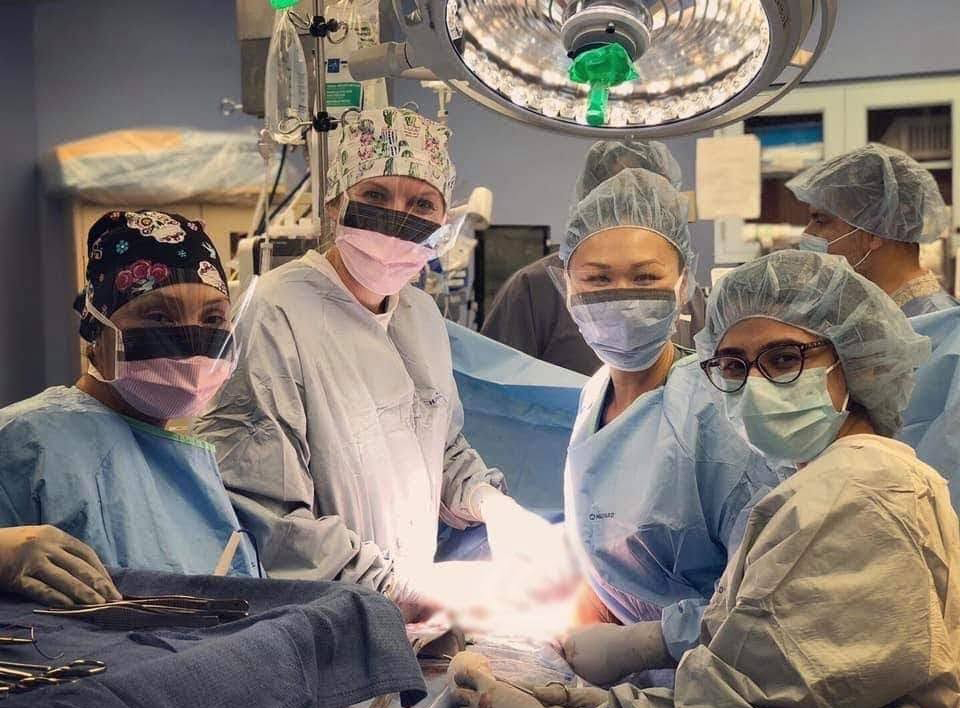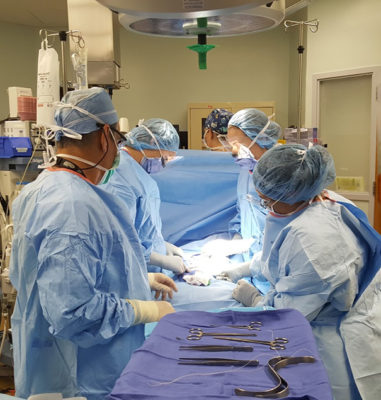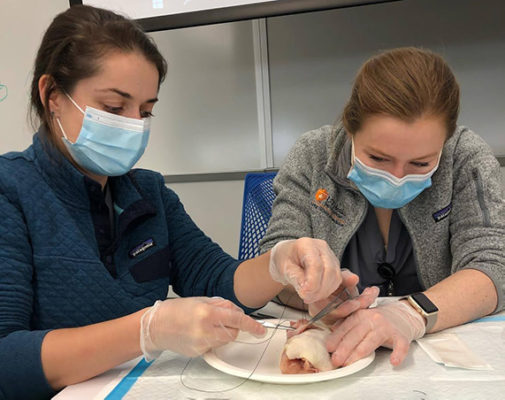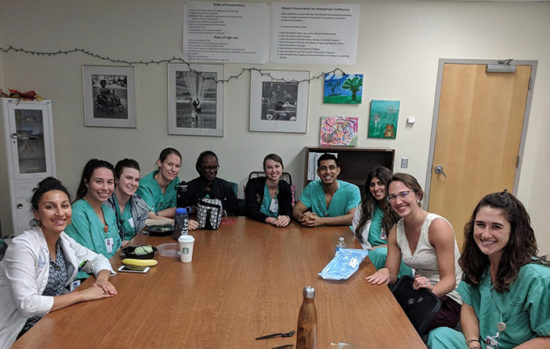Curriculum

Our clinical training includes rotations in general obstetrics and gynecology as the core of the curriculum. This includes inpatient ward, labor and delivery, women’s gynecologic emergency center, gynecologic surgical experience, including outpatient clinic experiences. Residents spend time regularly in their continuity clinic – patients that residents primarily manage under the direction of faculty throughout their 4 years. Additional resident clinics include office procedures, dysplasia and colposcopy clinics, ultrasound clinics, genetics clinics, and family planning clinics. Residents also spend time with genetic counselors and receive dedicated ultrasound training in their PGY-1 and PGY-3 years.
Residents also spend time in the subspecialties of gynecologic oncology, reproductive endocrinology and infertility, and female pelvic medicine and reconstructive surgery (urogynecology). Maternal-fetal medicine training is integrated throughout the obstetrics experience each year, with an emphasis on managing the antepartum service during the PGY-3 year.
Residents have some flexibility in shaping their curriculum to meet their personal career goals through selective rotations in the PGY-2 and PGY-3 years. Residents may choose any selective that enhances their preparation for their future career in OBGYN. Some choose a dedicated research month, surgical or neonatal ICU, an away rotation in line with fellowship plans, or a community OBGYN experience.
The residency program in Obstetrics and Gynecology at UT Health San Antonio consists of:
Year 1
| Training | Block |
|---|---|
| Obstetrics (OB triage, L&D, Postpartum, and outpatient) | 6 week block x 3 |
| Gynecology (inpatient, surgery, and outpatient clinics) | 6-7 week block x 2 |
| Night Float | 3-4 week block x 2 |
| GYN Onc | 3-4 week block |
| Ambulatory | 3-4 week block x 2 |
| Gynecologic Emergency Center | 3-4 week block |
Year 2
| Training | Block |
|---|---|
| Obstetrics (L&D and outpatient) | 6-7 week block x 2 |
| Gynecology (inpatient, surgery, and outpatient clinics) | 6-7 week block x 2 |
| Night Float | 3-4 week block x 2 |
| GYN Onc | 6-7 week block |
| Selective* | 3-4 week block |
| REI | 3-4 week block |
| Swing Shift | 3-4 week block |
| VA Gynecology | 3-4 week block |
Year 3
| Training | Block |
|---|---|
| Obstetrics (antepartum ward and outpatient) | 6-7 week block x 2 |
| Gynecology (inpatient, surgery, and outpatient clinics) | 3-4 week block x 2 |
| Night Float | 3-4 week block x 2 |
| Selective* | 3-4 week block |
| Urogynecology | 6-7 week block |
| VA | 3-4 week block x 2 |
| Research | 1 week block |
| Family Planning | 2 week block |
| Swing Shift | 3-4 week block |
| Gyn Onc | 3-4 week block |
Year 4
| Training | Block |
|---|---|
| Obstetrics (inpatient and outpatient) | 6-7 week block x2 |
| Gynecology (inpatient, surgery, and outpatient clinics) | 6-7 week block x2 |
| Night Float | 3-4 week block x 2 |
| GYN Onc | 6-7 week block |
| REI | 3-4 week block |
| VA | 3-4 week block |
| Ambulatory | 3-4 week block x 2 |
*Selective options are variable and in line with the resident’s career plans. Include internal and external rotations
Surgical Education
Residents are exposed to surgical training beginning early in the PGY-1 year. Residents learn surgical skills through a combination of simulation, assisting in surgery, and then advancing skills to the point of independent practice. We utilize 2 different surgical education models: “double-scrubbing” of junior with senior residents and a faculty surgeon, as well as residents scrubbing directly 1:1 with faculty surgeons. This results in a well-rounded surgical education with ample exposure and a graduated program of independence in the operating room. Our residents obtain a balance of vaginal, laparoscopic, hysteroscopic, robotic, and open surgical techniques throughout their residency so that they can feel confident offering various approaches to their patients in the future.
All residents have dedicated time in the curriculum to obtain Essentials in Minimally Invasive Gynecologic Surgery (EMIGS) certification, as well as a formal curriculum in robotic surgery. All residents gain ample experience in robotic surgery and may obtain certification upon completion of this residency if desired.

Didactic Education
Weekly didactic sessions are required for residents not on the night float service, and are based on CREOG Educational Objectives and ABOG topics included for board certification. Faculty coverage is provided to permit resident attendance. Didactic sessions include lectures, interactive sessions, journal clubs, simulations, and resident-led learning sessions. Some sessions are attended by all 4 year groups concurrently; at other times, they are separated by levels into “year-group” specific topics.

Reading Program
Residents are assigned regular reading with completion of a quiz to self-assess progress. Reading lists and quizzes are based on the resident’s year group and clinical rotation. The comprehensive reading program includes all topics in obstetrics, gynecology, and the subspecialties throughout the 4 year period, and covers the topics suggested by the CREOG Educational Objectives and included in the ABOG Board Certification Exam topics.
Residents are also provided suggested reading materials weekly in preparation for the Maternal Morbidity and Mortality Conference and the Gynecology Conference.
Residents have electronic access to the University of Texas Health Science Center at San Antonio library 24 hours a day.
Conferences
Conferences are held regularly to enhance learning and patient care:
- Antepartum conference
- Maternal Morbidity and Mortality conference
- Gynecology conference
- Gynecology Morbidity and Mortality conference
- Quality improvement/patient safety conference
- Root cause analysis
- Tumor board
- Perinatal conference (monthly)
- Multidisciplinary placenta accreta spectrum conference
- Benign Gynecology Pathology conference
- Gynecologic oncology conference

Contact us
For questions about the residency program, contact:
Jackie Barrera
Academic Programs Coordinator
Phone: 210-567-4953
Fax: 210-567-3485
Email: barrerajd@uthscsa.edu
Connect with us

“My favorite thing about the program is all of the surgery! I feel prepared to start a practice after residency.”
– Dr. Lauren Javernick, Class of 2021
